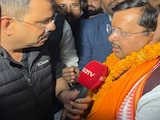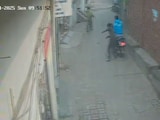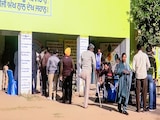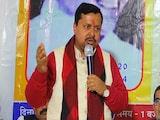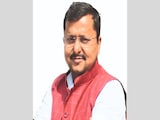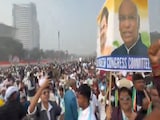How did you feel when you heard that General Pervez Musharraf had died? Were you sad? Were you overjoyed? Did you feel a tinge of sorrow and regret? Or did you find it hard to control your jubilation?
I'll tell you how I felt. I really couldn't give a damn.
Unlike many of the journalists and politicians who have written or tweeted about the General in the aftermath of his demise, I never really met the man. I was introduced to him at banquets and then attended that notorious breakfast meeting he had with editors during the Agra Summit. That's about it.
My view of him, judging by everything I had read before I physically set eyes on him, was that he was an extremely dodgy character who should never be trusted. It is hard to look fondly on a military dictator who seized power by overthrowing the legally elected government of Pakistan and whose chief claim to fame when he was military chief was the sneaky invasion of Kargil. So, I had to be persuaded to go to Agra and to accept his invitation for breakfast.
It was only when we sat down for breakfast that I realised that I was in a minority. Musharraf went around the table asking Indian editors to tell him what a wonderful chap he was. To my horror, the editors did just that. They treated him with so much reverence and sang his praises at such embarrassing length that even Musharraf looked surprised. I doubt he would have got so much love from editors in his own country.
Some of it, I suppose, was down to the Punjabi factor. In that era (but perhaps less so now), many Punjabis trotted out the nonsensical "we are the same people, yaar," banalities, lit candles at the Wagah border and believed that jhappi and pappi could achieve what foreign policy could not.
That's the only explanation I can find for my old friend Vinod Mehta's behaviour. "Sir," he gushed to Musharraf, "I support you so much that in India, they call me your man."
Musharraf nodded gravely, taking this compliment as his due and went on to the next editor, confident that more tail-wagging would follow.
It did. And so it went till Prannoy Roy and I spoiled his little party. I said what I thought was obvious - this man was the architect of Kargil. Why should any Indian trust him now?
Musharraf was slightly incredulous that the hitherto unbroken chain of sycophancy had been severed. "Trust, trust?" he bristled. "This question should have been asked before you invited me here. Not after."
Worse was to follow (from Musharraf's point of view, at least). It was Prannoy Roy's turn next and he asked another question that seemed to me to be the key to the General's credibility. Musharraf had spent so long talking about the wishes of the people of Kashmir but wasn't it odd that he himself had forcibly seized power in a military coup, not because of the wishes of the people of Pakistan?
Prannoy and I broke up Musharraf's little love fest with Indian editors and the breakfast ended on a sour note. So did the Agra summit itself, a little later.
That was the sum total of my interactions with Musharraf though he kept turning up in conversations with other people. When I interviewed Benazir Bhutto (who was then out of power), she told me that when she was Prime Minister, she had been presented with a blueprint of the Kargil operation. She had turned it down, she said, but the man who had presented the plan was Pervez Musharraf.
Yet people continued to trust Musharraf. When George W Bush came to the HT Summit, I asked him if he believed that Pakistan was hiding Osama bin Laden. Bush indicated that he did not think that Musharraf would do that.
When Manmohan Singh made his first trip to the UN as Prime Minister, he was (in my view, rightly) nervous about meeting Musharraf. But the wily old soldier charmed Singh so completely that to my horror, Singh said, on his way back to India: "General Musharraf is a man we can do business with."
On a subsequent trip to New York, for another UN session, Manmohan Singh was looking forward to dinner with Musharraf when, to the consternation of the Indian delegation, the General made a combative, strongly anti-Indian speech at the UN. At dinner when a shell-shocked Manmohan Singh asked him about the speech, Musharraf waved it away saying it had been written by a speechwriter and was of little consequence.
It was hard to escape the feeling that Musharraf ran circles around Manmohan Singh. Eventually, Singh even put his weight behind a so-called Kashmir peace deal that he had worked out with Musharraf. It was staggeringly clear (though not to Manmohan Singh) that not only would it never work but that neither man would be able to sell it to the people of their country.
The deal did not happen, Musharraf's position weakened in Pakistan and he lost power. It emerged that Musharraf had been lying to everyone, not just to nice old Dr Singh. He had been hiding Osama all along but had persuaded Bush and the global community that he had no idea where Bin Laden was.
So, given this background, forgive me for not being driven to tears by the news of Musharraf's demise. I don't buy the position many people are now taking - that in his later years, Musharraf was an advocate of peace with India. A man who spent his life planning military operations against our country and who offered shelter to terrorists and criminals from all over the world (from Osama to Dawood) could not have suddenly turned into an apostle of peace. Like nearly everything else Musharraf said and did, this was also an insincere position though his fans in India wanted desperately to believe otherwise.
Nevertheless, I don't think we should glory in his death or waste our time celebrating his demise. By the time he marched off to meet his maker, Musharraf was yesterday's man, a figure of no consequence.
And I don't think it is the Indian way to celebrate anyone's death. We are (or at least we should be) too dignified and too big a nation to sink to that level.
Which is why I began by saying I really didn't give a damn when I heard about Musharraf's death in exile in Dubai. He did his worst. And for a while it worked.
But look where he ended up. Look where Pakistan itself ended up. And consider where we are now.
(Vir Sanghvi is a journalist and TV anchor.)
Disclaimer: These are the personal opinions of the author.





